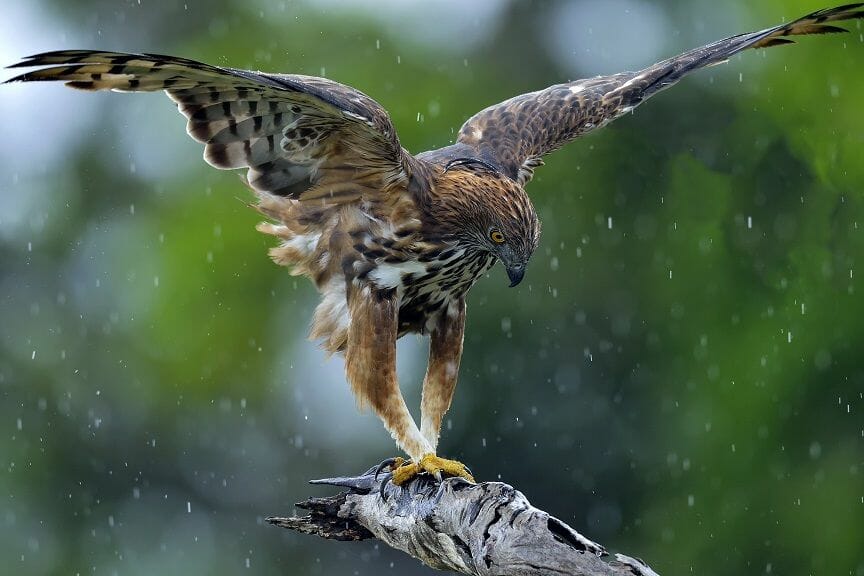Hawks have a lifespan of around 20 years in the wild and up to 30 years in captivity. Hawks are magnificent birds of prey that have been the subject of admiration and awe for centuries.
They are admired for their keen eyesight, sharp talons, and powerful wings that allow them to soar effortlessly through the sky. One of the most common questions people ask about hawks is how long they live. The lifespan of a hawk varies depending on the species, but on average, they can live up to 20 years in the wild and up to 30 years in captivity.
This article explores the different factors that affect a hawk’s lifespan and provides some fascinating facts about these impressive birds.

Credit: birdwatchingbuzz.com
Understanding The Average Lifespan Of Hawks
Hawks are magnificent birds of prey that can live for many years. Understanding their average lifespan is important for conservation efforts. There are different types of hawks such as red-tailed, marsh, and rough-legged hawks. These birds face many challenges that can affect their lifespan such as predators, food availability, climate change, and human activities.
Hawks can live up to 20 years, but this depends on the species and if they manage to survive the challenges they face. Studying the oldest hawks ever recorded can give us valuable insight into their longevity. By familiarizing ourselves with the different types of hawks and the factors affecting their lifespan, we can better protect these magnificent birds and ensure their survival for years to come.
The Impact Of Environmental Changes On Hawks Lifespan
Hawks lifespan is vulnerable to environmental changes, making it crucial to comprehend how different factors influence the bird’s survival. Climate change is undeniably one of the major threats for hawks. As the climate continues to warm, the availability of food and water sources decreases, thus putting pressure on hawks.
Furthermore, the increasing human population and subsequent habitat destruction result in the loss of nesting places and hunting grounds for hawks. Despite these significant challenges, there have been considerable efforts to rehabilitate and conserve hawk populations. The future of hawks depends on effective policies and collective efforts by individuals, communities, and governments to mitigate the effects of environmental changes and protect the habitats that support these majestic birds.
The Intricacies Of Hawks Health
Hawks are majestic birds that can live up to 20 years in captivity. However, in the wild, hawks can be affected by various health issues that can drastically affect their lifespan. Common causes include west nile virus, lead poisoning, lyme disease, and trauma from hunting or impact injuries.
Diagnosing and treating these issues is critical to ensuring that hawks have a long and healthy life. To diagnose health problems, a thorough examination is essential, including blood tests and imaging. Treatment may include medication, surgery, or rehabilitation. Understanding the impact of these health issues can help us take preventative measures to protect hawks and ensure they thrive in their natural habitat.
When it comes to the health of these beautiful birds, awareness and action are essential.
The Reproductive Life Of Hawks And Its Impact On Their Lifespan
Hawks are fascinating creatures, and understanding their reproductive life is crucial to understanding their lifespan. Mating habits vary depending on the species of hawk, with some having monogamous relationships. Nesting behaviors also differ, with some building their homes in trees and others on rocky cliffs.
The effects of reproduction on a hawk’s lifespan can vary, as raising chicks requires a lot of energy. However, this process is crucial for the species’ survival. Investigating the role of reproduction control can provide insights into increasing the lifespan of hawks while also maintaining healthy populations.
By understanding and protecting the reproductive life of hawks, we can ensure their survival in the wild for generations to come.
Frequently Asked Questions On Hawks Lifespan
How Long Do Hawks Live?
Hawks can live up to 20 years in the wild.
What Factors Affect Hawks’ Lifespan?
Diet, habitat, and predator threats can all affect a hawk’s lifespan.
How Do Hawks Survive In The Wild?
Hawks are skilled hunters and have excellent vision and hearing, allowing them to find prey and avoid danger.
Do Different Species Of Hawks Have Different Lifespans?
Yes, the lifespan of a hawk can vary depending on the species. For example, some species of hawks can live up to 30 years in the wild.
What Is The Most Common Cause Of Death For Hawks?
The most common cause of death for hawks is habitat loss and hunting by humans.
Conclusion
To sum it up, the lifespan of a hawk depends on various factors, including the species, habitat, and environmental conditions. Some species can live up to 20 years or more, while others have much shorter lifespans. Hawks play an essential role in the ecosystem, and it’s crucial to protect them.
Human activities such as habitat destruction, hunting, and pollution pose significant threats to hawks’ survival. Therefore, it’s our responsibility to ensure their conservation and preservation. Understanding the lifespan and behavior of hawks can help us take better care of them and their habitats.
By creating awareness and taking necessary steps to protect these magnificent birds, we can ensure that they continue to thrive for generations to come. So, let’s take action to protect these magnificent creatures and their ecosystem.
Latest Posts
The Ultimate List: Top 8 Best Birdwatching Podcasts for Avid Birders
Looking for the top birdwatching podcasts? Here are the eight best options to tune into today! Birdwatching can be a thrilling, immersive experience that brings...
Stop Squirrels in Their Tracks: 10 Effective Ways to Safeguard Your Bird Feeder Pole
To prevent squirrels from climbing your bird feeder pole, use squirrel baffles and slippery poles. Here are ten effective ways to keep squirrels from stealing bird food and damaging bird feeders. ...


